|
|
|
Sort Order |
|
|
|
Items / Page
|
|
|
|
|
|
|
| Srl | Item |
| 1 |
ID:
064547
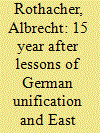

|
|
|
| 2 |
ID:
100190
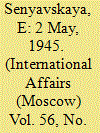

|
|
|
|
|
| Publication |
2010.
|
| Summary/Abstract |
THE PSYCHOLOGY OF THE WINNER in the Great Patriotic War is a unique phenomenon. It is the psychology of those people who lived through its initial period with its crushing defeats and retreats and the no less difficult subsequent stages with their unprecedented large-scale battles, when it was still not totally clear who would be the winner. But now there was no longer any doubt: our Victory was close at hand. And the feeling of being a winner, on the eve, during, and immediately after the Victory, indeed created a special psychological state in the people who had endured all the trials and tribulations and destroyed a strong, ruthless and lethal enemy.
It stands to reason that the entire war was a test of the spiritual and moral fiber of the Soviet soldier in conditions of constant risk, in situations that required immense exertion of every human strength, and often also self-sacrifice. Each period of the Great Patriotic War, with its particular moral and psychological dominant, determined the changes in the spiritual makeup of the frontline soldiers and in an individual's attitude to different areas of reality and life's values. But the feeling that Victory was near was particularly inherent in the final stage of the war, which in itself aroused an entire set of thoughts and feelings and a complex psychological state.
|
|
|
|
|
|
|
|
|
|
|
|
|
|
|
|
| 3 |
ID:
120061
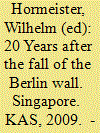

|
|
|
|
|
| Publication |
Singapore, KAS, 2009.
|
| Description |
147p.Pbk
|
| Series |
Panorama Insights into South East Asian and European Affairs
|
|
|
|
|
|
|
|
|
|
|
|
Copies: C:1/I:0,R:0,Q:0
Circulation
| Accession# | Call# | Current Location | Status | Policy | Location |
| 057218 | 943.087/HOR 057218 | Main | On Shelf | General | |
|
|
|
|
| 4 |
ID:
156070
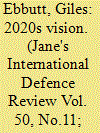

|
|
|
| 5 |
ID:
125113
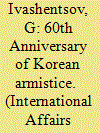

|
|
|
|
|
| Publication |
2013.
|
| Summary/Abstract |
ON JULY 27, 2013, it will be 60 years since the Armistice Agreement was signed in the village of Panmunjom, putting an end to the three-year Korean War. That war, which has become the bloodiest and most devastating military conflict since the end of World War II, remains an unhealed wound for the Koreans while its consequences are still making an impact on the international situation in Northeast Asia and beyond.
|
|
|
|
|
|
|
|
|
|
|
|
|
|
|
|
| 6 |
ID:
054012
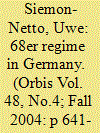

|
|
|
| 7 |
ID:
090673
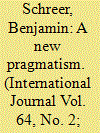

|
|
|
|
|
| Publication |
2009.
|
| Summary/Abstract |
The analysis here examines the major factors leading to a change in Germany's approach towards the alliance. It proceeds in three broad steps. First, evidence for a shift in German NATO policy is provided. Second, the most important external and domestic factors affecting German behaviour in NATO are identified. In the final section, some predictions for future German NATO policy are made, as well as some implications for the alliance as a whole.
|
|
|
|
|
|
|
|
|
|
|
|
|
|
|
|
| 8 |
ID:
123843
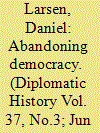

|
|
|
|
|
| Publication |
2013.
|
| Summary/Abstract |
Through an examination of American policy toward Germany during late 1918 to 1919, this article challenges widely held ideas about the attitudes of American President Woodrow Wilson toward democracy promotion. Scholars typically have seen in Wilson's foreign policy the antecedents of several subsequent U.S. presidents' policies of democracy promotion and democratic interventionism. This study contends that at least during the second half of Wilson's presidency, however, Wilson did not regard it as appropriate for the United States to intervene in the internal political affairs of other nations to promote democracy. While he hoped that postwar Germany would come to embrace democracy, he believed that the Germans would have to find democracy on their own. Despite the fact that those American diplomatic officials who were most familiar with the situation in Germany continually urged a more active U.S. policy to promote democracy there, Wilson remained deeply skeptical of the new German government and adhered firmly to the view that the United States should refrain from attempting to influence Germany's internal political affairs.
|
|
|
|
|
|
|
|
|
|
|
|
|
|
|
|
| 9 |
ID:
192142
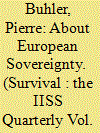

|
|
|
|
|
| Summary/Abstract |
The coining of the concept of ‘European sovereignty’ by French President Emmanuel Macron in 2017 has prompted a heated debate, reviving disputes over supranationality, the nation-state and democracy that have resonated since the inception of the European project. Macron’s intervention came at a time when a flurry of crises compelled the European Union to move from its ambition of being a ‘normative power’ to living through its ‘Machiavellian moment’, against the backdrop of the rise of new global powers and existential threats for the security of the Union and its member states. But the term ‘European sovereignty’ is a misnomer. The real issue is one of power, not of sovereignty. Power proceeds from command, hardly an attribute of the complex shared decision-making process of the EU, leaving the objective of becoming a fully-fledged power out of reach for the European polity.
|
|
|
|
|
|
|
|
|
|
|
|
|
|
|
|
| 10 |
ID:
133755
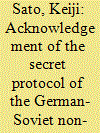

|
|
|
|
|
| Publication |
2014.
|
| Summary/Abstract |
In June 1989, the First Congress of People's Deputies of the Soviet Union established the Commission for Historical and Legal Estimation of the Soviet-German Non-aggression Pact of 1939. In the commission, representatives from Estonia, Latvia and Lithuania condemned the Soviet annexation of the Baltic States, prompting heated arguments regarding the invalidity of the related secret protocol of the pact with other members who continued to hold the traditional Soviet ideological view of the pact as something positive. The debate over the secret protocol had the further potential to extend to disputes over 'recovery of lost territory' amongst the Baltic States, Ukraine, Moldova, Belarus and Russia. This article analyses the arguments used by commission members, considering the interplay of national interests, how they balanced arguments between restoration of 'state sovereignty' and maintenance of borders, and how they finally compromised and concluded the commission's report.
|
|
|
|
|
|
|
|
|
|
|
|
|
|
|
|
| 11 |
ID:
093888


|
|
|
|
|
| Publication |
2010.
|
| Summary/Abstract |
Conflict prevention, more than other fields of international politics and foreign policy, is characterized by a multiplicity of state and non-state actors, giving rise to particularly complex coordination challenges. This article evaluates the extent to which the German response to these challenges, the action plan for civilian conflict prevention, has succeeded in its aim of improving coordination to increase policy coherence between different governmental agencies as well as with civil society actors. It finds that although the general approach is indeed promising, the government's lack of commitment prevents it from tapping into the action plan's full potential.
|
|
|
|
|
|
|
|
|
|
|
|
|
|
|
|
| 12 |
ID:
037486
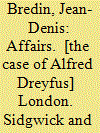

|
|
|
|
|
| Publication |
London, Sidgwick and Jackson, 1987.
|
| Description |
xii, 628p.Hbk
|
| Standard Number |
0283994436
|
|
|
|
|
|
|
|
|
|
|
|
Copies: C:1/I:0,R:0,Q:0
Circulation
| Accession# | Call# | Current Location | Status | Policy | Location |
| 029313 | 923.544/BRE 029313 | Main | On Shelf | General | |
|
|
|
|
| 13 |
ID:
130221
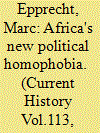

|
|
|
|
|
| Publication |
2014.
|
| Summary/Abstract |
Uganda has a population problem. The United Nations forecasts that the number of people living there will surpass the combined populations of Germany, Italy, and Japan by the end of this century-growing to 205 million in an area about the size of Oregon. It is hard to imagine how this will help with Uganda's
current poverty problem. The nation ranks 161st in the world in the UN's Human Development Index. Having deployed troops in Somalia and South Sudan and suffered terrorist attacks in the capital city, Kampala, Uganda also has a security problem. This partly explains the harassment and repression of the press and civil society groups by a government that is increasingly intolerant of any dissent.
|
|
|
|
|
|
|
|
|
|
|
|
|
|
|
|
| 14 |
ID:
062165
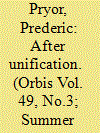

|
|
|
| 15 |
ID:
131427
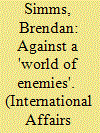

|
|
|
|
|
| Publication |
2014.
|
| Summary/Abstract |
Adolf Hitler's experiences during the First World War have been much discussed, with historians tending to concentrate on his involvement in the fighting and the operational lessons he later claimed to draw. Much less has been written about the impact of the war on his world view, though recent work has tended to suggest that his paranoid anti-Semitism was not yet visible during the conflict. Drawing on this latest research, but also on newly discovered sources and previously underused material, the author shows that Hitler's main preoccupation during the war and its immediate aftermath was the overwhelming power of Great Britain and its American ally. He associated these two powers with the alleged international Jewish economic conspiracy that had crushed the German empire. Hitler's anti-Semitism thus originated in an anti-capitalist, rather than anti-communist, discourse. He blamed Britain and the US for the rigours of the Versailles peace settlement, a moment which was far more politically formative for him than the experience of defeat itself. His encounter with American soldiers in the summer of 1918 also marked his first engagement with the global power of the United States and the start of a belief in the demographic weakness of the German empire which inspired his plans for Lebensraum in the east.
|
|
|
|
|
|
|
|
|
|
|
|
|
|
|
|
| 16 |
ID:
034567
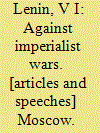

|
|
|
|
|
| Publication |
Moscow, Progress Publishers, 1966.
|
| Description |
376p.Hbk
|
|
|
|
|
|
|
|
|
|
|
|
Copies: C:1/I:0,R:0,Q:0
Circulation
| Accession# | Call# | Current Location | Status | Policy | Location |
| 032519 | 923.147/LEN 032519 | Main | On Shelf | General | |
|
|
|
|
| 17 |
ID:
146253
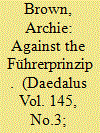

|
|
|
|
|
| Summary/Abstract |
The Führerprinzip has not been confined to Nazi Germany. The cult of the strong leader thrives in many authoritarian regimes and has its echoes even in contemporary democracies. The belief that the more power a president or prime minister wields the more we should be impressed by that politician is a dangerous fallacy. In authoritarian regimes, a more collective leadership is a lesser evil than personal dictatorship. In countries moving from authoritarian rule to democracy, collegial, inclusive, and collective leadership is more conducive to successful transition than great concentration of power in the hands of one individual at the top of the hierarchy. Democracies also benefit from a government led by a team in which there is no obsequiousness or hesitation in contradicting the top leader. Wise decisions are less likely to be forthcoming when one person can predetermine the outcome of a meeting or foreclose the discussion by pulling rank.
|
|
|
|
|
|
|
|
|
|
|
|
|
|
|
|
| 18 |
ID:
146865
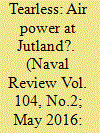

|
|
|
| 19 |
ID:
154052
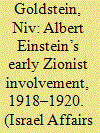

|
|
|
|
|
| Summary/Abstract |
This article presents the very beginning of Albert Einstein’s involvement on behalf of the Zionist movement. Although he was familiar with Zionist activists, it was only World War I and the rabid anti-Semitism attending it that led him to rediscover his affiliation with the Jewish people and to subscribe to the Zionist solution to their misery. Einstein tried to combine his support for the national Zionist ideals with the universal worldview to which he adhered from time immemorial, gradually coming to support establishment of the national home in Palestine as a solution for ‘The Jewish Problem’.
|
|
|
|
|
|
|
|
|
|
|
|
|
|
|
|
| 20 |
ID:
085815
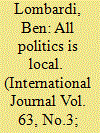

|
|
|
|
|
| Publication |
2008.
|
| Summary/Abstract |
Given the debates over the NATO mission in Afghanistan, it might be assumed that German interest in that country is unprecedented. Yet history holds a different record, for an earlier generation of German leaders also paid condiderable attention to Afghanistan.
|
|
|
|
|
|
|
|
|
|
|
|
|
|
|
|
|
|
|
|
|